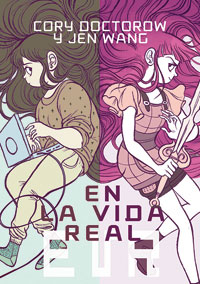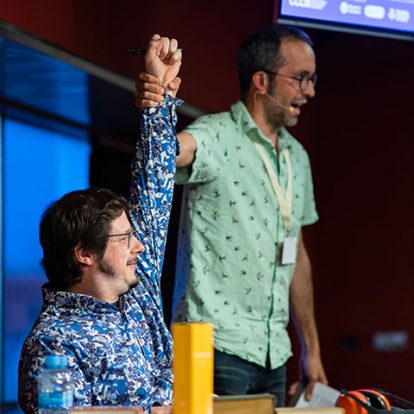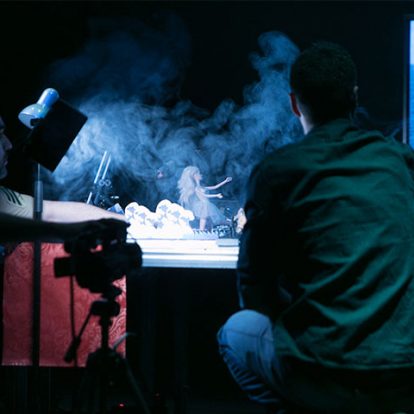Introduction to “In Real Life”
Cory Doctorow
05 May 2015
Introduction to In Real Life, by Cory Doctorow, Editorial Roca, 2015. We will talk with Cory Doctorow on 20th May.
 [Introduction courtesy of Editorial Roca]
[Introduction courtesy of Editorial Roca]
In Real Life is a book about games and economics. A lot of us pay attention to games, but think of them as trivial—mere amusements that help us fill the long, dismal stretch between the cradle and the grave. As to economics, well, yeah, people think economics are important, but it’s also one of those intimidating no-go areas that scares people away, despite the fact that economics—the study of why people do things, really—is the subject that has the most to say about the circumstances in which they find themselves.
When you put economics and games together, you suddenly find yourself in the middle of a bunch of sticky, tough questions about politics and labor. In Real Life connects the dots between the way we shop, the way we organize, and the way we play, and why some people are rich, some are poor, and how we seem to get stuck there.
I hope that readers of this book will be inspired to dig deeper into the subject of “behavioral economics” and to start asking hard questions about how we end up with the stuff we own, what it costs our human brothers and sisters to make those goods, and why we think we need them.
But it’s a poor politics that can only express itself by choosing to buy or not buy something. Sometimes (often!), you
need to organize to make a difference. This is the golden age of organizing. If there’s one thing the Internet’s changed forever, it’s the relative difficulty and cost of getting a bunch of people in the same place, working toward the same goal. That’s not always good (thugs, bullies, racists, and loonies never had it so good), but it is fundamentally game-changing.
It’s hard to remember just how difficult this organizing stuff used to be: how hard it was to do something as trivial as
getting ten friends to agree on dinner and a movie, let alone getting millions of people together to raise money for a political candidate, get the vote out, protest corruption, or save an endangered and beloved institution.
When I was an activist in the 1980s, ninety-eight percent of our time was spent stuffing envelopes and writing addresses on them. The remaining two percent was the time we spent figuring out what to put in the envelopes. Today, we get those envelopes and stamps and address books for free. This is so fantastically, hugely different and weird that we haven’t even begun to feel the first tendrils of it. Moments like the Occupy movement and the Gezi uprising in Istanbul will be remembered as the tiniest tremors of what happens when people can organize more cheaply.
Working together is the secret origin story of our species. We diverged from our hominid ancestors when we
started to divide up labor—you watch the kids, I’ll watch for tigers, and that guy’s going to go and forage for fruit. The
most modern part of our brains, the neocortex (the “new bark,” which wraps around all the more ancient parts of our brains), developed around this time and is strongly implicated in managing our social relationships. Everything from
language and literacy to corporations and countries are just structures for organizing human labor.
The games we play with other people all tickle this organizing mechanism. When you play hide and seek, you try
and outguess where your opponents will look (or where they’ll hide when they’re trying to out outguess you!). When
you do a mass raid on some huge instance in an MMO (a massively multiplayer online game), the “game” isn’t just
killing the boss, it’s figuring out how to convince a couple dozen of your friends to work with you, coordinating your
schedules so that you can raid together, agreeing on tactics, even coming up with a chain of command and hammering out its legitimacy.
It’s not surprising that gamespace has become a workplace for hundreds of thousands of “gold farmers” who undertake dreary, repetitive labor to produce virtual wealth that’s sold to players with more money and less patience than them. The structural differences between in-game play and in-game work are mostly arbitrary, and “real” work is half a game, anyway. Most of the people you see going to work today are LARPing (live-action role playing) an incredibly boring RPG (role-playing game) called “professionalism” that requires them to alter their vocabulary, posture, eating habits, facial expressions—every detail all the way down to what they allow themselves to find funny.
The most amazing thing about the moment we’re living through is the degree to which it allows us to abolish all the boring stuff that used to be required for any kind of ambitious project. We’re at a point where we can build an
encyclopedia with the kind of organizational structures that were once only good enough to run an ambitious fun fair
or bake sale. Hierarchy and injustice are far from dead, but the justification for continuing them gets weaker with every passing moment.
The net doesn’t solve the problem of injustice, but it solves the first hard problem of righting wrongs: getting everyone together and keeping them together. You still have to do the even harder work of risking life, limb, personal fortune, and reputation.
Every wonderful thing in our world has a fight in its history: our rights, our good
fortune, our happiness. All that is sweet was paid for, once upon a time, by principled people who risked everything
to change the world for the better.
Those risks are not diminished one iota by the net. But the rewards are every bit as sweet.









